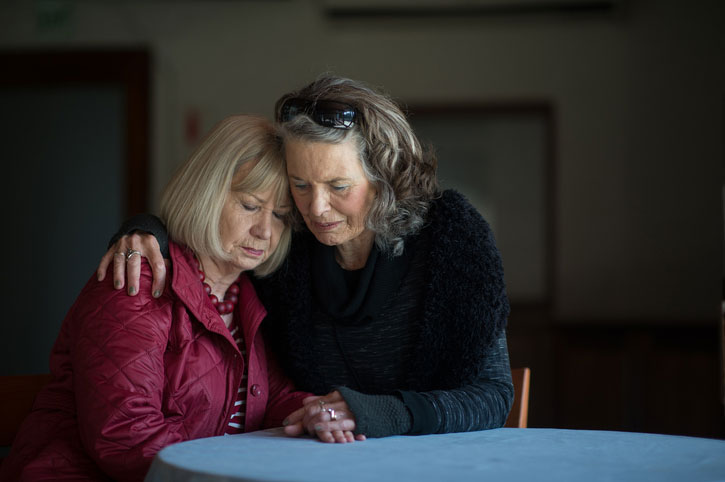When a loved one becomes terminally ill, it can be a challenging time both emotionally and physically. You will not only be tasked with their physical care, but likely be responsible for taking on additional duties they once performed. On top of all of this day-to-day activity, you will need to be preparing yourself for the grieving process to come after your loved one passes. It is easy to become consumed by their illness and care and fail to take the steps necessary to prepare yourself emotionally. Below are some tips to help you get through this difficult transition and impending loss.
Don’t Be Afraid to Be Realistic
It is okay to be realistic about the situation while still holding onto hope. Too many people feel they need to either come to terms with the fact their loved one will be gone soon and abandon all hope, or hold out hope that their loved one will recover and give no thought to the possibility they may not make it. Most of the time you will fall somewhere in the middle of the spectrum. You understand what the doctors and medical professionals have told you, and the statistics of the illness, but you still hold out a little hope that a tiny miracle may occur.
Don’t Be Afraid to Ask for Help
You may feel it is your job to take care of all your loved one’s needs when they are suffering from an illness, but the truth is, they may prefer the company of your just being there rather than being the one to clean and feed them. Ask for help from family or visiting nurses so the time you spend together can be the quality time you both can enjoy to its fullest. Perhaps confine your duties to the bedtime ritual or dinnertime and allow others to help with the other tasks.
Don’t Feel Bad Wanting Some Time to Yourself
 Taking care of a loved one who is ill can be taxing. You may find yourself overwhelmed and overly stressed out. You may be afraid to leave their side for fear of something happening, but if you leave someone competent in charge while you are gone, it is okay to step away once in a while. One vital thing to remember is that you are no good to them if you are so stressed or burned-out you can’t even function. Whether your time away is as simple as taking a relaxing bath, going into another room to read, or getting out of the house to give yourself a chance to recharge, those times will help you get through the rest of the journey.
Taking care of a loved one who is ill can be taxing. You may find yourself overwhelmed and overly stressed out. You may be afraid to leave their side for fear of something happening, but if you leave someone competent in charge while you are gone, it is okay to step away once in a while. One vital thing to remember is that you are no good to them if you are so stressed or burned-out you can’t even function. Whether your time away is as simple as taking a relaxing bath, going into another room to read, or getting out of the house to give yourself a chance to recharge, those times will help you get through the rest of the journey.
Don’t Dwell on Past Wrongs or Resentments
It is times like these you remember all the past wrongs you and your loved one perpetrated against each other. This is the time to let go of those past resentments, forgive in your heart, and then forget. You can drive yourself crazy if you focus on these incidents, and trying to use this time to get some kind of closure may ruin the last of the time you have together. Reiterate your love for them verbally, so they know all is forgiven and talk about the wonderful memories you have of your life together. Putting them in a place where they have good things to think will help to give them peace. When they are gone, it will also make it easier for you, knowing you expressed your love openly.
Take Your Loved One’s Requests Seriously
Part of preparing for the grieving process is knowing that you did all you could to follow your loved one’s last requests. No matter what they ask to do, take them seriously and try to find a solution that will work. If they are in the hospital and want to go out to see the sunset or visit one of their favorite places, discuss with the hospital the logistics and do what you can to make it happen – even if it means their time may be shortened. When someone comes to the end of their life, they want it to be on their terms. By allowing them these requests, you are helping them achieve that.
Talk to Someone to Help You Cope
While many people talk with a therapist or trusted advisor after the death of a loved one, you may find the process of their passing easier if you talk to someone throughout the process. They can help you deal with your emotions early and prepare you mentally for what is to come. It is sometimes best to talk to someone removed from the situation so they can be objective and you can say whatever you need to get off your chest – even things like built-up anger.
Surround Yourself With Those You Love
 Typically when your loved one passes, you will suddenly be surrounded by a family trying to help you through the difficult time. You can help prepare yourself a little better by talking with close friends and family ahead of time and requesting their support earlier. Let them know you may need help with arrangements or would like them to stay on for a period afterward. It is much easier to make arrangements beforehand, as you may not be in the right mindset after to let others know what you need.
Typically when your loved one passes, you will suddenly be surrounded by a family trying to help you through the difficult time. You can help prepare yourself a little better by talking with close friends and family ahead of time and requesting their support earlier. Let them know you may need help with arrangements or would like them to stay on for a period afterward. It is much easier to make arrangements beforehand, as you may not be in the right mindset after to let others know what you need.
Plan for Services Ahead of Time
While this is a difficult topic for anyone to wrap their head around when a loved one is sick, it is much better to take care of these arrangements before they pass. This allows for their input, so you know you are respecting their wishes. It also eliminates some of the stress when you are in the midst of the grieving process. Take a family member or close friend with you and have as much as you can in place. Then, designate that individual as the contact to take care of the last minute details. It is also good to put specific family members in charge of the visitation and events after the service, to take some of the burden off as you are just beginning the grieving process.
Keep on Top of Daily Tasks
Stay on top of paying your bills and taking care of the daily details of your life so you will have at least a few weeks after your loved one passes to not have to worry about anything. It is also a good idea to have the necessary documents ready for such things as closing out their social security number or removing their names from accounts and property titles. Having this ready  will allow you to simply obtain the death certificate and send it in. You might even want to provide a family member with the forms already filled out and ask them to take care of the final process.
will allow you to simply obtain the death certificate and send it in. You might even want to provide a family member with the forms already filled out and ask them to take care of the final process.
By relying on help from those around you, taking time to relax and recharge, and having everything ready in advance, you will be more prepared for the grieving process. It can be all too easy to spend the first few weeks stressed out, angry, and unable to properly mourn your loss. It is important to remember both of you will have your own struggles with this major transition. Being prepared can make it a little bit easier.







